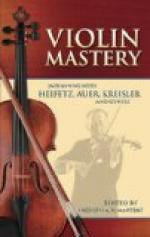“I think that wire strings are largely used now-a-days because gut strings are hard to obtain—not because they are better. I do not use wire strings. I have tried them and find them thin in tone, or so brilliant that their tone is too piercing. Then, too, I find that the use of a wire E reduces the volume of tone of the other strings. No wire string has the quality of a fine gut string; and I regard them only as a substitute in the case of some people, and a convenience for lazy ones.
VIOLIN MASTERY
“Violin Mastery? Off-hand I might say the phrase stands for a life-time of effort with its highest aims unattained. As I see it the achievement of violin mastery represents a combination of 90 per cent. of toil and 10 per cent. of talent or inspiration. Goetschius, with whom I studied composition, once said to me: ’I do not congratulate you on having talent. That is a gift. But I do congratulate you on being able to work hard!’ The same thing applies to the fiddle. It seems to me that only by keeping everlastingly at it can one become a master of the instrument.”
VI
ARTHUR HARTMANN
THE PROBLEM OF TECHNIC
Arthur Hartmann is distinctly and unmistakably a personality. He stands out even in that circle of distinguished contemporary violinists which is so largely made up of personalities. He is a composer—not only of violin pieces, but of symphonic and choral works, chamber music, songs and piano numbers. His critical analysis of Bach’s Chaconne, translated into well-nigh every tongue, is probably the most complete and exhaustive study of “that triumph of genius over matter” written. And besides being a master of his own instrument he plays the viola d’amore, that sweet-toned survival, with sympathetic strings, of the 17th century viol family, and the Hungarian czimbalom. Nor is his mastery of the last-named instrument “out of drawing,” for we must remember that Mr. Hartmann was born in Mate Szalka, in Southern Hungary. Then, too, Mr. Hartmann is a genial and original thinker, a litterateur of no mean ability, a bibliophile, the intimate of the late Claude Debussy, and of many of the great men of musical Europe. Yet from the reader’s standpoint the interest he inspires is, no doubt, mainly due to the fact that not only is he a great interpreting artist—but a great artist doubled by a great teacher, an unusual combination.
[Illustration:
Photo by E.F. Foley, N.Y. ARTHUR HARTMANN,
with
hand-written note]
Characteristic of Mr. Hartmann’s hospitality (the writer had passed a pleasant hour with him some years before, but had not seen him since), was the fact that he insisted in brewing Turkish coffee, and making his caller feel quite at home before even allowing him to broach the subject of his visit. And when he learned that its purpose was to draw on his knowledge and experience for information which would be of value to the serious student and lover of his art, he did not refuse to respond.




